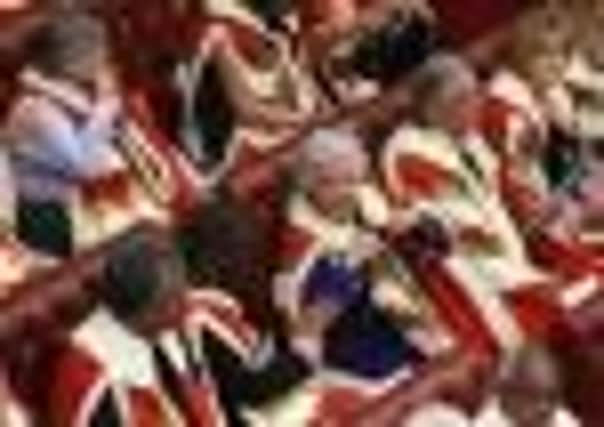Duncan Hamilton: House of Lords adds unexpected sparkle to dull political debate


I hold an openly contradictory position on the House of Lords. I suspect I am not alone. We all understand and accept that the most basic commitment to democracy demands that an argument in support of an unelected second chamber is, in the 21st century, unsustainable. And yet, for all its failings, the House of Lords works.
Listen to Today In Parliament and you witness the tempering role. Whether on welfare reform or overhaul of the NHS in England and Wales, the Lords regularly asserts its right to reject. Moreover, the tone of the debate is altogether more adult and (ironically) more representative than the baying mob of the Commons.
Advertisement
Hide AdAdvertisement
Hide AdPlainly, since the Parliament Acts of 1911 and 1949, the ultimate primacy of the House of Commons has been beyond doubt. But in a sense that accepted primacy, far from being a bone of contention, has fostered an appropriate and subtle relationship between the two Houses of Parliament in which the Lords can chide, criticise and reject, but in which the power of the people as expressed through their elected representatives will always prevail. Reform, if it comes, must therefore focus on the preservation of that useful, reflective working relationship.
Party politics exists in the Lords, of course it does. Votes are whipped, just as in the Commons. Nevertheless, the absence of a party hierarchy able to deselect at will can surely only encourage more honest and constructive debate. Plainly the hereditary principle is wrong, but the concept of Life Peers (or perhaps better still a fixed term of 15 years?) has the significant advantage of building experience and encouraging independence of thought.
Beyond that, I personally like the idea that there are a series of members who have nothing whatsoever to do with elected party politics. What is wrong with faith groups having limited representation, so long as that includes every significant faith group and not just the Church of England? Why shouldn’t leading members of society from academia, medicine, law and business have a forum in which that experience can be utilised in the public interest? It is true that they could stand for election, but most wouldn’t. And even if they did, as non-affiliated candidates with no party apparatus to assist, what realistic chance would they have?
Certainly many argue that if these people seek to govern in any form, and seek to take public money for doing so, then only elected office will keep them honest and allow us to scrutinise. And yet all expenses and registered interests of peers are already published. As the spate of recent criminal convictions makes plain, you don’t have to be elected to be accountable.
More fundamentally, how would a fully elected Lords sit with the public mood which is emphatically that of growing disenchantment with party politicians and central party control? Wouldn’t we be eliminating one of the last means of encouraging a more diverse political discourse?
Any argument against a fully elected Lords depends, of course, on the alternative means of appointment. Currently, that is an act of largely political patronage. The House of Lords Appointments Commission was created in 2000 to improve matters. The Commission developed criteria for appointment with which it would be difficult to quarrel. Fifty-seven peers have been nominated via that route and all chose to become cross-benchers of no affiliation. That’s good, but even so, cross-benchers account for only a fifth of the House of Lords. We are talking about leaders in the arts, criminal justice, health and international development. Don’t we need more of those people, not fewer? A fully elected Lords makes that significantly less likely.
So yes, Lords reform must happen, and certainly an elected aspect of that second chamber is both inevitable and right. But let’s be careful – there are independent-minded people of calibre and experience who come to public service by a route other than party politics. Excluding those people by handing exclusive power to political parties is democratic. But is it better?
What, finally, of the changing nature of the UK? Imagine, for example, the emergence of a quasi-federal structure. The current House of Lords might then evolve into a federal chamber, a forum for collective UK policy (for example on foreign affairs) which could additionally review the legislation of each domestic parliament. In that scenario the elected Scottish Parliament might have primacy over the Lords, just as would the Commons (perhaps by then sitting as an English Parliament).
Advertisement
Hide AdAdvertisement
Hide AdIn that scenario, a fully elected House of Lords would distort the new constitutional set-up precisely because the Lords could then claim an equal democratic legitimacy. The wise path, therefore, is to first resolve what the Lords is for. Do that, and questions of election or appointment become altogether easier to resolve.